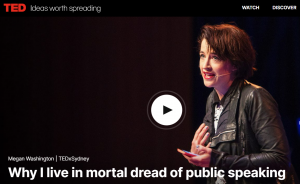Stuttering, Predicitive Processing & Public Speaking
Recently I read a paper on predictive processing and the dialogue of 2 speakers, A duet for one by Karl Friston. It got me reflecting on my own stutter and how predictive processing might help me get a deeper understanding into my interactions with others. Throughout my whole life the stutter has been present, through primary/ secondary school and into my adult life. It’s not the worst thing in the world but is certainly something that can affect confidence in social settings, public speaking & people’s perceptions of you.
In my first year out of university, I was asked to lecture in anatomy for a semester at RMIT. The strange part of this was if you met me in the hallway, I would stutter my way through each sentence but in the lecture theatre in front of 60 students I owned the space, and my stutter was not present. The enigma of my stutter was certainly frustrating, I did not give another lecture for 13 years. Then 6 years ago, I wanted to drive a networking group towards learning together as a group, so I decided to run presentations myself to inspire others to step up. I choose a nice easy topic ………. stress, pain and neuroplasticity to a group a health care clinician, what could go wrong? The presentation went well inspired me to continue to lecture and help other practitioners on their journeys. Over this time, I have grown as a person and my stutter is now far less pronounced, it will still show up if I am tired or I have had a beer or two, but overall, it’s a lot better.
People who stutter are often seen as “highly disfluent, they must also be highly nervous, anxious and inept” (Byrd 2017). Self-reporting of a stutter seems to correlate to listeners having a more positive model of the speaker and “respond more positively to speakers who use a neutral, non-apologetic self-disclosure statement” (Boyd 2017). I have also seen this in my presentations, when I give a self-disclosure statement about my stutter, the interactions with the audience seem to flow. When you give the statement, it is also important when, “A self-disclosure statement at the beginning of the dialogue received more positive listener comments than those presented at the end” (Byrd 2017). When people would come up to me and say, “they really enjoyed my presentation”. I would think to myself, they are just nice people because surely having a stutter makes it hard to listen to me! As it turns out having the stutter makes me more relatable, people really connect with me a real human and owning the space in a non-apologetic manner helps the audience view me as a strong and capable person.
When we interact with people, we have internal models that help us to predict upcoming linguistic input. Most people haven’t been around people with a severe stutter so lack the internal model to predict. “Findings suggest the listeners hearing sentences containing stuttering abandon prior expectations, possibly because they lack a speaker model defined by the presence of stuttering. In the presence of stuttering, listeners appeared to focus on the input itself instead of using prior knowledge to form early (erroneous) interpretations and increasing accuracy of sentence interpretations” (Lowder 2020). The self-disclosure statement may provide enough error to wright the sampling towards the environment- in this case words (Rathbone). This is pointing to the fact that precision weighting is shifted to more the sampling of linguistic content rather than the priors.
Another interesting aspect of the influence of self-disclosure statement is how a positive self-disclosure state can change the focus on the stutter. “There was no difference in actual percentage of syllable’s stuttered by the speakers, observers reported that the monologues preceded by a self-disclosure statement sounded as though the speaker “stuttered less” and “less trouble talking”. Thus, the use of a self-disclosure may reduce observer focus on the behaviour of stuttering and allow for more focus on the content of the speaker’s message” (Byrd 2017). This correlates nicely to what I see during my presentations, when the audience would report at the start, they noticed my stutter then after a bit they no longer notice the stutter anymore. What we are seeing I think is an updating of the internal models of you by the listener.
Unfortunately, “gender bias is strong with stuttering, observers rating females more negatively than males with character traits, regardless of self-disclosure statements” (Byrd 2017). We can see there is a blending of many inferences we make about a person’s identity and how this intersectionality can compound the negative biases about a person. Can becoming aware of this intersectionality in ourselves towards others, give us enough flexibility and space to wright towards error and influence precision weighting towards the sampling? Creating space for us to see the person that is in front of us with openness and care, no matter what their gender, race, class or disability. Below is a short video by the amazing Megan Washington, esteemed song writer and singer who will hopefully help facilitate a more positive shift in understanding around stuttering and gender bias.
Stuttering has been a part of my entire life, but now I am bringing acceptance to it, embracing its apart of me and what makes me, me. The person who benefits the most from a positive and non-apologetic self-disclosure statement as the “act of acknowledging stuttering indicates acceptance and understanding”. Reading these papers has allowed me to better understand the ways I interact with people and ways I can facilitate building better relationships.
Reference
Byrd McGill Gkalitsiou Cappellini, The Effects of self-disclosure on male and female perceptions of individual stutter, American journal of speech Language pathology, 2017
Lowder Maxfield Ferreira, Processing of self-repairs in stuttering and non-stuttered speech, Lang Cogn Neurosci, 2021
Friston, A duet for one, Consciousness and Cognition, 2015

